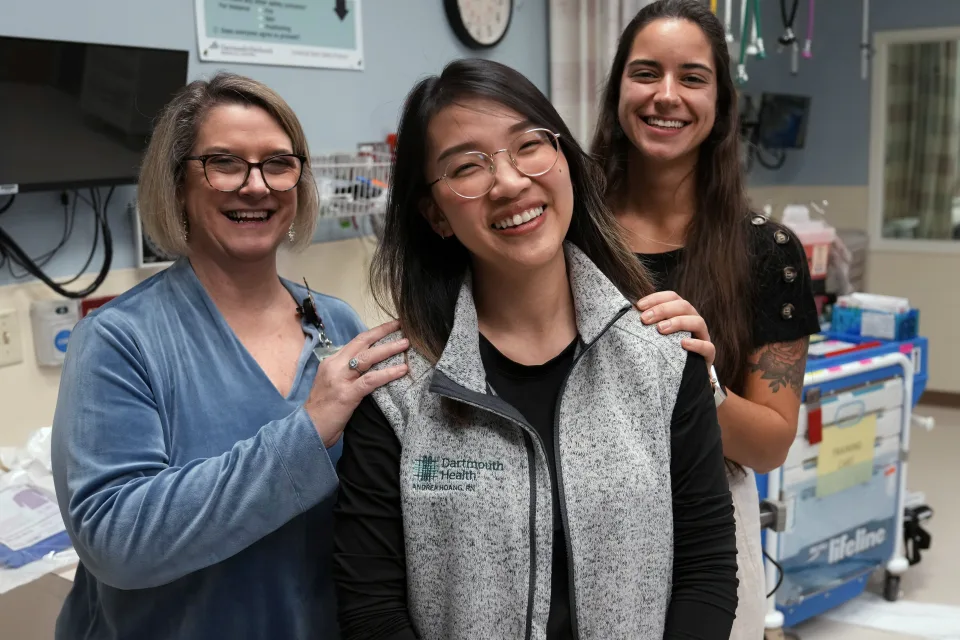Nurse Cardiac Arrest New Hampshire
At the Dartmouth-Hitchcock Medical Center in Lebanon, New Hampshire, Andy Hoang, a recent nursing graduate, is pictured in the center with her co-workers Lisa Davenport (left) and Justina Terino. During a cardiac training session on Tuesday, Dec. 5, 2023, Hoang, 23, experienced dizziness and nausea. Instead of practicing chest compressions on a mannequin, her four colleagues promptly responded and administered aid to her at the spot where she was stricken.
Andy Hoang embarked on her nursing career in New Hampshire this year, eager to specialize in cardiac care. During a November practice session at Dartmouth-Hitchcock Medical Center on responding to cardiac arrest, the 23-year-old began feeling dizzy and nauseated. The excitement turned into an urgent situation as she collapsed and went into cardiac arrest. Instead of practicing on a mannequin, her colleagues immediately intervened, providing crucial assistance in the real-life scenario.
One checked her carotid, one her femoral (arteries), and she did not have a pulse,” recounted instructor Lisa Davenport.
Immediately, the nurses initiated CPR, and a “code blue” was declared, summoning the medical emergency team.
The situation was particularly stressful for Davenport, as they had never experienced a real code blue in the center, despite routine training.
Davenport urgently called for assistance, and fortunately, the critical care team from the Lebanon hospital, engaged in a separate session, came to their aid. Additional nurses joined, connecting Hoang to a defibrillator, inserting an IV line, and administering oxygen. A doctor and nurse from another department swiftly arrived with crash carts.
By the time the emergency team reached them, Hoang was regaining consciousness. Although only 15 minutes had passed since Hoang collapsed, Davenport noted that the intensity of the situation made it feel much longer.
It worked out, but it was pretty frightening for all of us,” shared Davenport. “You just don’t expect that to happen with someone as young as Andy.”
Charmaine Martin, another nurse at the scene, echoed the sentiment, describing it as a scary moment but also highlighting the strong teamwork and support they experienced.
For Hoang, who has recently returned to work, the incident was beyond belief. “I would say I’m your pretty average healthy 23-year-old,” she remarked. Engaging in regular exercise, running, and maintaining a healthy diet, she emphasized the importance of staying in shape for her demanding work schedule of 12 to 13 hours a day.
Cardiac arrest, the abrupt loss of heart function, contributes to over 436,000 deaths in the United States each year, according to the American Heart Association, distinguishing itself from a heart attack, which results from a blocked blood flow to the heart.
Cardiac arrest may follow a heart attack, but the American Heart Association notes that various conditions, such as a thickened heart muscle (cardiomyopathy), heart failure, and arrhythmias, can disrupt the heart’s rhythm and lead to cardiac arrest.
According to data from the National Heart, Lung, and Blood Institute, the risk of cardiac arrest rises with age, being uncommon in individuals younger than 30. Younger individuals face increased risk due to factors like genetic arrhythmias, heart structure issues, coronary artery problems, heart inflammation, and substance abuse. Additionally, cardiac arrests are more prevalent in both men and women, with the risk increasing after menopause.
Before the day she experienced cardiac arrest, Hoang had fainted twice, once due to low blood sugar from not eating and the second time accompanied by sharp abdominal pain.
“So, nothing like this, nothing to this extent,” she emphasized.
Originally from Vietnam, Hoang, who arrived in the United States in 2016 as a student, revealed that her family has no history of heart problems. After obtaining her nursing degree in Michigan, she lived with a family in Montana before moving to New Hampshire.
During her recovery, Hoang wore a heart-monitoring patch to record the electrical activity of her heart, providing valuable data for doctors.
The ordeal has deepened her bond with the other nurses, now considering them her best friends. “We basically went through this whole life-or-death experience,” she reflected.
I am so grateful for Andy and her courage. She is an excellent nurse and someone I call friend,” Martin said.
Hoang said she feels like she’s part of a family at work, not just an employee. Her family told the AP they are extremely grateful that she was surrounded by medical personnel when she went into cardiac arrest.
It was care given by nurses to her grandfather, who died a couple of years ago, that made Hoang want to switch her career focus from graphic design to nursing. But she never expected she would become a patient.
“It really changed my perspective on how I view life, like ‘Hug your family a little longer,’” she said. “Tell them that you love them, because it might be the last time you get to say it to them. And just cherish life for what you’ve been given. It’s precious, and I didn’t realize how precious it was until I nearly lost it.




